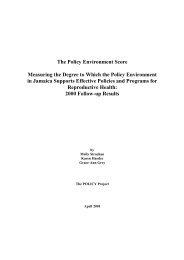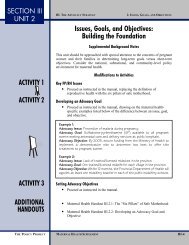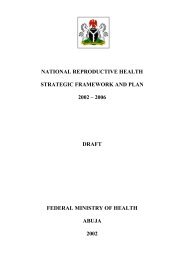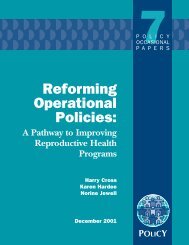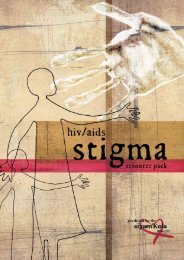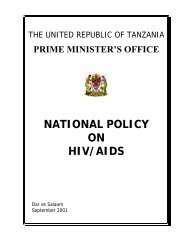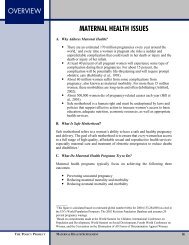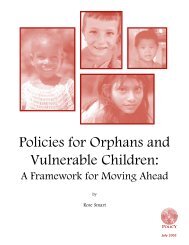THE OVC RAAAP FINAL REPORT - POLICY Project
THE OVC RAAAP FINAL REPORT - POLICY Project
THE OVC RAAAP FINAL REPORT - POLICY Project
You also want an ePaper? Increase the reach of your titles
YUMPU automatically turns print PDFs into web optimized ePapers that Google loves.
Historical Context of Government and Donor Response to HIV/AIDS and <strong>OVC</strong><br />
Many of the <strong>OVC</strong> Desk Review findings paint a bleak reality of neglect toward children orphaned and made<br />
vulnerable by the HIV/AIDS epidemic. Yet, the findings also demonstrate how citizens and governments in all<br />
17 countries, so afflicted by poverty, hunger, disease, and—in many cases—war and conflict, are making<br />
concerted efforts to reach <strong>OVC</strong> who are in desperate need of love, care, and support. In reading and<br />
interpreting the findings, it is essential that we examine and place in context the responses made by<br />
governments and donors to the overall pandemic during the last two decades. Through this historical<br />
referencing, we are better able to see how decisions of the past are now influencing the present.<br />
The first cases of AIDS surfaced in Africa in the mid-1980s. At that early stage, national governments and the<br />
international donor community approached AIDS as a public health issue. Given that perspective, ministries of<br />
health in AIDS-affected nations became the chief managers of national coordinated responses. They were also<br />
the principal recipients of early HIV/AIDS funding. Unfortunately, ministries of health have often been among<br />
the least funded and least empowered arms of government.<br />
As the HIV/AIDS pandemic grew, so, too, did government and donors’ understanding of and response to it. As<br />
ministries of health geared up to control the spread of HIV and treat those infected, a broader range of support<br />
was needed to coordinate expanded HIV-prevention programming. At this point, ministries of education also<br />
became involved. Similar to the ministries of health, however, these ministries also experienced severe<br />
shortages in staff, technical capability, funding, and capacity building.<br />
Governments and the international community have only recently begun to cultivate and solidify more<br />
comprehensive, national HIV/AIDS responses through a multisectoral partnership effort. Today in all 17<br />
countries surveyed, those involved in building a response to HIV/AIDS—including the <strong>OVC</strong> crisis—include<br />
governments, donors, INGOs, NGOs, religious and faith-based organizations, community-based organizations,<br />
and grassroots groups. In some countries, caregivers and older orphans are also contributing to program design<br />
and development.<br />
Many positive steps have been taken to control the epidemic and to begin assessing and providing greater<br />
leadership around <strong>OVC</strong>-related issues. However, the early tendency to delegate HIV/AIDS responsibility to<br />
weaker government ministries continues, particularly in the realm of <strong>OVC</strong> care and support. As the <strong>OVC</strong> Desk<br />
Reviews reveal, in many of the 17 countries, the ministry responsible for <strong>OVC</strong> care and support tends to be the<br />
least powerful—for multiple reasons. In Mozambique, for example, where the Ministry of Women is the lead<br />
<strong>OVC</strong> agency, a senior government contact reported that “there is very weak” coordination of <strong>OVC</strong> programs<br />
and confirmed that the Ministry of Women “is one of the least resourced ministries” in the government. This<br />
contact further noted that it is “very hard to find out who, exactly, is or is supposed to be coordinating specific<br />
<strong>OVC</strong> activities.” Parallel examples exist in Malawi and Nigeria, where the Ministry of Gender and Community<br />
Services and the Federal Ministry of Women Affairs and Youth Development, respectively, are the lead<br />
government agencies.<br />
In Malawi, Mozambique, and Nigeria there is little, if any, enforcement of existing women’s and children’s<br />
rights, and legal reforms that could provide greater protections are slowly occurring at best. Given this context<br />
(which is not limited to the aforementioned examples), it is not surprising that national strategies to expand<br />
financial assistance and care and support to <strong>OVC</strong> and their caregivers have not yet reached donor or<br />
government priority lists. In other <strong>OVC</strong> <strong>RAAAP</strong> countries, responsibility for the <strong>OVC</strong> crisis has been<br />
delegated to not just one single ministry, but to three or four. In Zimbabwe, the Ministry of Public Services,<br />
Labor, and Social Affairs, the Ministry of Legal Affairs, and the Ministry of Basic Education, Sports, and<br />
Culture are in charge of all <strong>OVC</strong> coordination. While shared responsibility could potentially lead to achieving<br />
greater coverage for <strong>OVC</strong>, data from the <strong>OVC</strong> Desk Reviews reveal that multiple leaders often appear to<br />
diffuse efforts and produce fragmented outcomes.<br />
11



